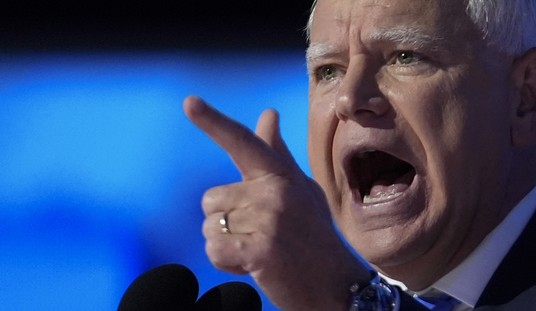A senior Libyan has pleaded for U.S. intervention as Khadafi refuses to quit. “In Tobruk, Maj. Gen. Suleiman Mahmoud, who defected Sunday from his post as the commander of the local army garrison … urged the U.S. and other powers to support the uprising and not to allow their interests in Libya’s petroleum reserves, Africa’s largest, to keep them sidelined.” The UN Security Council demanded an “immediate end to the violence”; the Arab League suspended Libya and the EU — with Italy and Malta dissenting — called for sanctions, but only the maligned and despised United States has the capability to intervene.
U.S. intervention. Can it? Should it? The answer to the first is yes and the answer to the second is: why? Simon Henderson and David Schenker, writing at ABC News, suggest a “no-fly zone” to ground the Libyan air force but predict that when the smoke clears, the Islamists are likely to emerge at the top of the heap:
If the crisis continues, the country’s long-repressed Islamist movement could benefit. Led by the Libyan Islamic Fighting Group, the movement has an impressive history of supporting jihadist causes, having worked with al-Qaeda for more than a decade. Since 2003, Libya has been the second-leading source (after Saudi Arabia) of insurgents entering Iraq via Syria. And not coincidentally, a plurality of these jihadists hailed from Darna, the epicenter of the rebellion. More recently, al-Bayda –a village not too far from Darna — was declared an “Islamic Caliphate” by the locals following its liberation this week.
So caught between a rock and hard place, the New York Times, perhaps reflecting the administration’s desire not to be seen as abetting Khadafi’s bloody reprisals yet afraid to act to unseat him, describes officials talking out loud, like Hamlet deciding whether or not he should act:
Mrs. Clinton said the United Nations Security Council was the proper place for further action against Libya. After a day of debate on Tuesday, the Security Council condemned the use of force against peaceful demonstrators in Libya and called for those responsible for such attacks to be held to account. Mrs. Clinton said that the situation on the ground was still too murky to make a judgment. “As we gain a greater understanding of what is actually happening,” she said, “we will take appropriate steps in line with our values, our principles and our laws.” She noted that communications were largely shut down.
Among the steps the United States could take, analysts said, would be to reintroduce the sanctions it imposed on Colonel Qaddafi, starting in the 1970s, for state-sponsored terrorism, most notably the bombing of a Pan Am plane over Lockerbie, Scotland. It lifted the sanctions after Libya renounced terrorism.
An even more drastic step would be instituting a no-flight zone over Tripoli to prevent warplanes or helicopters from shooting at protesters. But NATO planes would likely have to enforce such a ban, and analysts said the alliance was unlikely to take such a step without a much greater escalation of the violence.
Administration officials said drafting a United Nations sanctions resolution would take time, since the Security Council would have to prove a case against Libya — something that could be difficult, given the chaos on the ground.
Hamlet was positively impulsive compared to the “international community.” The Christian Science Monitor describes how the world “weighed its limited options” on Libya, reporting suggestions of sanctions “and at least one United Nations official says the Libyan regime should be investigated for possible crimes against humanity in the wake of deadly antiprotester violence in the North Africa country.” This suggests inaction, since recourse to the UN is always a sure sign that diplomats are prepared to do nothing. The World Body’s real function is to serve as giant carpet, under which crises can be swept to stink and fester. Still, the president, under pressure to intervene, may ultimately be compelled by political considerations to “do something.” And that imperative, given the complete absence of persuasive influence on Libya, means that only coercion is available to him.
Or maybe he’s going to give them money. Consider Chicago.
The need to do something without actually doing anything is also confronting Rahm Emanuel, now mayor of Chicago. He takes charge of a city as bankrupt as the federal government or even more so, if that were possible. “The city is literally on the brink of bankruptcy with a structural deficit approaching $1 billion when under-funded employee pensions are factored in.” That great city of Big Shoulders, from whence Hope and Change came to Washington, is contemplating not having two dimes to rub together. Fran Spielman, the City Hall reporter of the Sun-Times, writes:
Mayor Daley borrowed to the hilt, sold off revenue-generating assets and spent most of the money to hold the line on taxes in his last two budgets. The city even borrowed $254 million to cover back pay raises long anticipated for police officers and firefighters. …
Here’s a rundown of the challenges confronting Chicago’s new mayor: Four city employee pension funds will run out of money by 2030. A bill approved by the Illinois General Assembly over Daley’s objections would saddle homeowners and businesses with a $550 million property tax increase in 2015 unless pension concessions are negotiated or another new revenue source is found.
Emanuel has already rankled union leaders by suggesting cuts in the benefits of existing employees. Now, he must negotiate that. …
Before confronting a $720 million deficit, deciding which schools to close and whether to disband or keep funding a student safety program bankrolled by expiring federal stimulus funds … Negotiations are due to begin by year’s end with the Chicago Teachers Union and they could get dicey with more layoffs required and pay raises demanded. …
United and American Airlines are suing to block the city from completing Mayor Daley’s signature project — the massive runway expansion program at O’Hare Airport. They have argued that the debt required would make O’Hare “among the highest-cost airports in the country,” saddling them with costs they can’t afford to pay for a project they won’t need for “many years.” …
The state still owes the CTA $82.5 million from the borrowing deal brokered by Gov. Quinn to avert fare hikes. The freeze on fares expires Dec. 31. So do union contracts covering 9,000 CTA employees, who are expected to demand plenty after seeing 1,057 of their members laid off and having a healthy chunk of the 16 percent pay raise they got over the last five-years swallowed up by increased pension and health care contributions. …
Daley’s final budget assumes a full year of savings from union concessions not yet negotiated. …
In a word, Chicago is screwed. It has debt it can never repay, unions it can never satisfy, a school system that doesn’t add up, a transport system that is going nowhere, and a police force that plans to use cadets to fill in for real cops. That makes it virtually certain that Rahm Emanuel — like the Libyan defectors — is going to ask Barack Obama to intervene. Not with bombs or no-fly zones. But with bonds and debt moratoriums. The sovereign remedy of public policy, both domestic and international, is to stick it to the taxpayers, who are going to have to find a way to choose between bad and badder.
Can the unions really get what they want? Will EU/UN/OIC/International Community really do the heavy lifting for once?
[youtube O4NrT2oTQqE]
Hmm. This process is sometimes called “investing in the future” or “kicking the can down the road,”or just “Hope and Change.” In every case it means that someone, somewhere is coming for the taxpayers’ remaining money. Whether “they” are Libyan Islamists or Chicago unions is really a matter of detail. What are the chances that the bitter clingers can avoid being shafted? Let’s ask the genius at Dumb and Dumber.
Lloyd: What do you think the chances are of a guy like you and a girl like me… ending up together?
Mary: Well, Lloyd, that’s difficult to say. I mean, we don’t really…
Lloyd: Hit me with it! Just give it to me straight! I came a long way just to see you, Mary. The least you can do is level with me. What are my chances?
Mary: Not good.
Lloyd: You mean, not good like one out of a hundred?
Mary: I’d say more like one out of a million.
[pause]
Lloyd: So you’re telling me there’s a chance… *YEAH!*
Take heart. There’s a chance.
“No Way In” print edition at Amazon
Tip Jar or Subscribe for $5










Join the conversation as a VIP Member